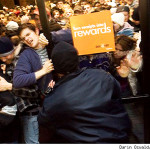
By Haddon Libby
During the five days of over indulgence a/k/a the Super Bowl of Shopping a/k/a Thanksgiving weekend, which day are you most likely to get the best deal when shopping? Is it Thanksgiving Thursday, Black Friday, Shop Local Saturday, The yet-to-be-named Sunday or Cyber Monday?
If you said Thanksgiving Thursday, you were correct. The next best days in order are the yet-to-be-named Sunday, Black Friday, Cyber Monday, the Friday after Black Friday and then Shop Local Saturday. If you are looking for the worst day to get a good deal, go shopping on December 14th. If you are a retailer, the best day to make a sale is the yet-to-be-named Sunday.
A study by Accenture pointed out how approximately 40% of consumers will brave the crowds during the Black Friday weekend. This is down from 52% in 2009. Consumer Reports believes that the number of shoppers is even lower than this.
Consumers are shopping and spending less on Black Friday as many of the best deals come on these other days. Spending on Black Friday in 2012 dropped 1.8% to $11.2 billion vs. 2011 while Thanksgiving through Monday sales were up 12.5% to $59 billion. This means that Black Friday represented less than 20% of the spending over those days. As I’m sure that you’ve noticed, retailers are releasing Black Friday deals earlier and earlier. Some of the first holiday deals showed up in September this year. This longer sales cycle deemphasizes the importance of the more notable day for shopping.
The origin of the term Black Friday for the day after Thanksgiving dates back to 1961 in Philadelphia. While the two days after Thanksgiving considered two of the best days for sales throughout the year, the Police Department had less than fond thoughts of those days. Given the massive traffic jams and overcrowded sidewalks caused by shoppers as well as the annual Army-Navy football game, the police began calling those days Black Friday and Black Saturday. Given the negative connotations that ‘Black Friday’ suggested, local retailers discussed the derogatory reference with the city after which they tried to rename those days as Big Friday and Big Saturday with no success.
By the 1980s, an alternative meaning to Black Friday began to emerge based on an accounting term. Once upon a time, accountants used to keep financial losses in the financial ledger in red and profits in black. For many retailers, the day after Thanksgiving represents a turn of their financial fortunes into the black. The first published example of this reference was in the Philadelphia Inquirer in 1981.
Cyber Monday is a term created by Shop.org, an arm of the National Retail Federation in 2005. The term marked a then emerging trend where shoppers who were too busy over the holidays to hunt for deals, began looking online on that day. In many cases, the searches occurred from work computer. The peak moment for shopping online on Cyber Monday is 11:25am EST.
Lastly, we should not forget Shop Local Saturday. This day is meant to be a day where shoppers frequent local small businesses. The day finds its roots in a blog posting by former small business owner Cinda Baker in 2009. Within a year, American Express was promoting the day in national ads. The day is an emerging trend where those interested in supporting local businesses specifically seek out those businesses to show their support for businesses that are vital to the economic health and vitality of their communities.
As for the yet-to-be named Sunday, how about Money Sunday?















































